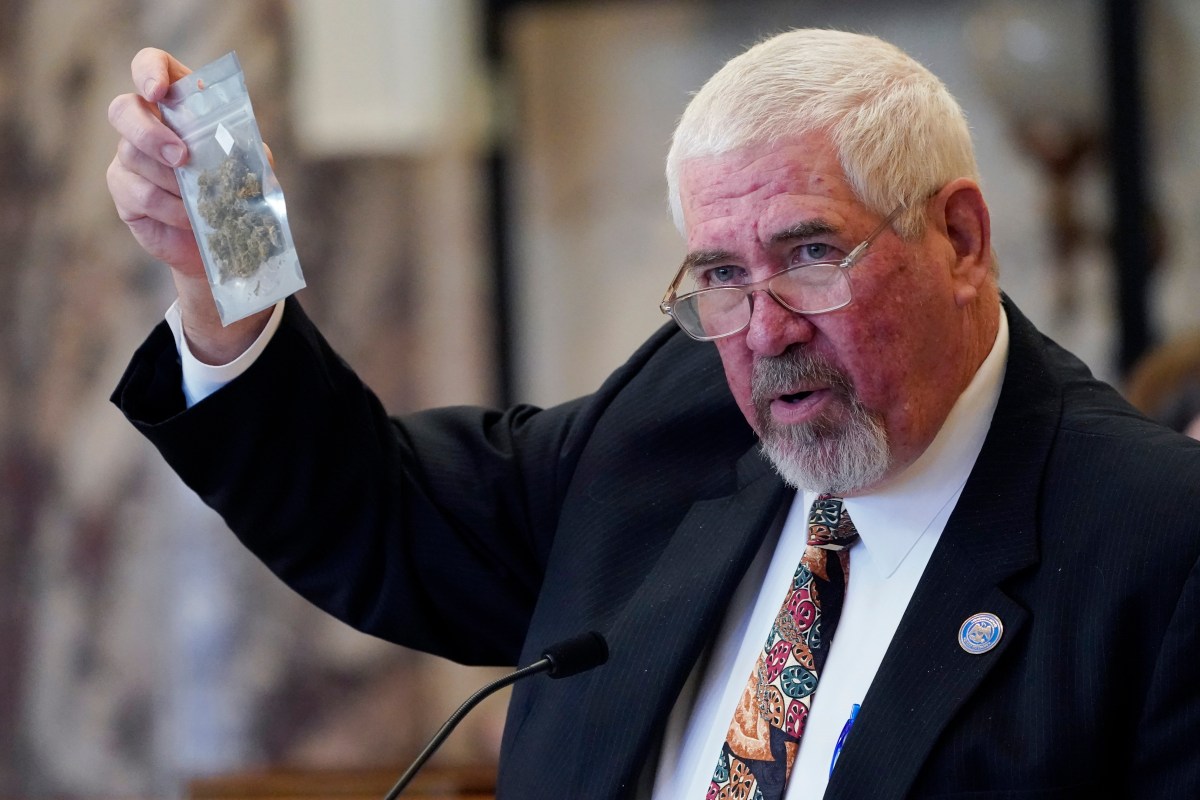Mississippi Today
Changes to the medical marijuana law are headed to Gov. Reeves’ desk. Here’s what they are.

Changes to the medical marijuana law are headed to Gov. Reeves’ desk. Here’s what they are.
The Legislature has approved changes to Mississippi’s cannabis law that will limit the information available to the public about businesses’ citation records and will attempt to crackdown on inconsistencies from the agencies tasked with running the new medical marijuana program.
The bill, first filed in the House, was amended by a Senate committee and the full Senate before the House passed it last week. Gov. Tate Reeves must sign the bill before the new regulations are added to the law. The changes span fromminor language tweaks to new provisions on background checks and public records.
The medical marijuana program has been fully operable — with dispensaries selling Mississippi-grown cannabis — for just under three months.
The rollout hasn’t been without hiccups. A Mississippi Today investigation found the Department of Health wasn’t being consistent, especially in its approval of cultivation plans, while dealing with a backlog of applications.
Legislators echoed businesses’ concerns throughout hearings over the bill.
“Unfortunately the Department of Health in their rules and regs probably accepted some things that were not intentioned (sic) by the bill,” said Sen. Kevin Blackwell, a Republican from Southaven and one of the bill’s authors on the floor on March 8. “So we are trying to correct those … and we do so in the bill.”

Legislators approved a new addition that says: “No state agency, political subdivision or board shall implement any rule, regulation, policy, or requirement that is contrary to the provisions of the Mississippi Medical Cannabis Act.”
The bill also turns a mistake by the health department into part of the law. Blackwell told the Senate that the department approved a large operator’s secondary location under one license when it submitted its application. The adjustment allows for the state’s largest cannabis growers to have up to two locations as long as the total canopy size doesn’t exceed 150,000 square feet.
That makes the setup of Mockingbird Cannabis, one of the state’s leading cultivators, with a smaller secondary greenhouse-style location 12 miles from their main site acceptable under one license.
While growers have been debating if adapted greenhouses should be permitted, none of the bill’s updates directly address their use.
Mississippi Today was able to learn specifics about Mockingbird – and the construction of its greenhouse – through a public records request for the DOH’s investigation records.
The law’s changes make investigation records, including citations handed out by health department agents, exempt from the public record law until an investigation has concluded and all appeals ended.
An early draft of the bill called for such records to remain exempt from public record indefinitely, but some senators found the records being exempt from public record for any period unacceptable.
“I think if it was put out in transparency, it would dispel any of the back and forth on social media,” said Sen. Angela Burks Hill, R-Picayune, one of five senators who voted against approving the changes. “I think hiding that is only going to fuel that speculation.”

Critics pointed out an appeal process could take a long time, keeping citation records away from the public and legislators even if they’re ultimately found valid. Blackwell said the changes were made because of “falsehoods” being spread on social media as competitors became aware of other growers’ cited infractions.
The addresses of all cannabis-related businesses, outside of dispensaries, will also be exempt from public record and no longer posted publicly. Rep. Lee Yancey, R-Brandon, said during hearings this was to protect businesses already not accessible to the public, which could be targets vulnerable to crime because of the large amount of cash and marijuana products on hand.
The bill includes several other changes that affect patients and businesses:
- The Department of Health will now have only 10 days within submission (changed from 30) to approve a patient’s medical cannabis card application. This change comes after MDOH has experienced major backlogs in processing applications.
- Patients can now have a follow up with a different doctor than the one who first approved their medical cannabis card without disrupting their care or access to medical marijuana.
- Doctors and nurses who have approved a patient to receive a medical cannabis card can now help them fill out the online application with the state. Yancey said this was especially to help elderly patients.
- The law now specifies the Mississippi Justice Information Center of the Department of Public Safety and the Federal Bureau of Investigation will handle background checks on workers and caregivers.
- Testing facilities can become licensed transporters or contract with transporters.
- Businesses can display marijuana imagery in company logos and other branding. Dispensaries can also post pictures online to display what they sell.
- Hemp products are not affected by the cannabis act.
- Dispensaries can sell hemp items that are legal under federal law, such as low-THC products known as “CBD.” Dispensaries can also sell topical products that contain marijuana, which cannot be ingested, to patrons over 21 who don’t have a medical cannabis card. These products have to be placed in a separate area than the products for card holders.
- Dispensary licensees now have 18 months instead of 12 to complete construction and still maintain their accreditation.
- The health department can contract with private laboratories for compliance testing, but those labs cannot also perform commercial testing for medical cannabis businesses.
This article first appeared on Mississippi Today and is republished here under a Creative Commons license.
Did you miss our previous article…
https://www.biloxinewsevents.com/?p=226639
Mississippi Today
Mississippi River flooding Vicksburg, expected to crest on Monday
Warren County Emergency Management Director John Elfer said Friday floodwaters from the Mississippi River, which have reached homes in and around Vicksburg, will likely persist until early May. Elfer estimated there areabout 15 to 20 roads underwater in the area.
“We’re about half a foot (on the river gauge) from a major flood,” he said. “But we don’t think it’s going to be like in 2011, so we can kind of manage this.”
The National Weather projects the river to crest at 49.5 feet on Monday, making it the highest peak at the Vicksburg gauge since 2020. Elfer said some residents in north Vicksburg — including at the Ford Subdivision as well as near Chickasaw Road and Hutson Street — are having to take boats to get home, adding that those who live on the unprotected side of the levee are generally prepared for flooding.



“There are a few (inundated homes), but we’ve mitigated a lot of them,” he said. “Some of the structures have been torn down or raised. There are a few people that still live on the wet side of the levee, but they kind of know what to expect. So we’re not too concerned with that.”
The river first reached flood stage in the city — 43 feet — on April 14. State officials closed Highway 465, which connects the Eagle Lake community just north of Vicksburg to Highway 61, last Friday.

Elfer said the areas impacted are mostly residential and he didn’t believe any businesses have been affected, emphasizing that downtown Vicksburg is still safe for visitors. He said Warren County has worked with the U.S. Army Corps of Engineers and the Mississippi Emergency Management Agency to secure pumps and barriers.
“Everybody thus far has been very cooperative,” he said. “We continue to tell people stay out of the flood areas, don’t drive around barricades and don’t drive around road close signs. Not only is it illegal, it’s dangerous.”
NWS projects the river to stay at flood stage in Vicksburg until May 6. The river reached its record crest of 57.1 feet in 2011.




This article first appeared on Mississippi Today and is republished here under a Creative Commons Attribution-NoDerivatives 4.0 International License.![]()
Mississippi Today
With domestic violence law, victims ‘will be a number with a purpose,’ mother says
Joslin Napier. Carlos Collins. Bailey Mae Reed.
They are among Mississippi domestic violence homicide victims whose family members carried their photos as the governor signed a bill that will establish a board to study such deaths and how to prevent them.
Tara Gandy, who lost her daughter Napier in Waynesboro in 2022, said it’s a moment she plans to tell her 5-year-old grandson about when he is old enough. Napier’s presence, in spirit, at the bill signing can be another way for her grandson to feel proud of his mother.
“(The board) will allow for my daughter and those who have already lost their lives to domestic violence … to no longer be just a number,” Gandy said. “They will be a number with a purpose.”
Family members at the April 15 private bill signing included Ashla Hudson, whose son Collins, died last year in Jackson. Grandparents Mary and Charles Reed and brother Colby Kernell attended the event in honor of Bailey Mae Reed, who died in Oxford in 2023.
Joining them were staff and board members from the Mississippi Coalition Against Domestic Violence, the statewide group that supports shelters and advocated for the passage of Senate Bill 2886 to form a Domestic Violence Facility Review Board.
The law will go into effect July 1, and the coalition hopes to partner with elected officials who will make recommendations for members to serve on the board. The coalition wants to see appointees who have frontline experience with domestic violence survivors, said Luis Montgomery, public policy specialist for the coalition.
A spokesperson from Gov. Tate Reeves’ office did not respond to a request for comment Friday.
Establishment of the board would make Mississippi the 45th state to review domestic violence fatalities.
Montgomery has worked on passing a review board bill since December 2023. After an unsuccessful effort in 2024, the coalition worked to build support and educate people about the need for such a board.
In the recent legislative session, there were House and Senate versions of the bill that unanimously passed their respective chambers. Authors of the bills are from both political parties.
The review board is tasked with reviewing a variety of documents to learn about the lead up and circumstances in which people died in domestic violence-related fatalities, near fatalities and suicides – records that can include police records, court documents, medical records and more.
From each review, trends will emerge and that information can be used for the board to make recommendations to lawmakers about how to prevent domestic violence deaths.
“This is coming at a really great time because we can really get proactive,” Montgomery said.
Without a board and data collection, advocates say it is difficult to know how many people have died or been injured in domestic-violence related incidents.
A Mississippi Today analysis found at least 300 people, including victims, abusers and collateral victims, died from domestic violence between 2020 and 2024. That analysis came from reviewing local news stories, the Gun Violence Archive, the National Gun Violence Memorial, law enforcement reports and court documents.
Some recent cases the board could review are the deaths of Collins, Napier and Reed.
In court records, prosecutors wrote that Napier, 24, faced increased violence after ending a relationship with Chance Fabian Jones. She took action, including purchasing a firearm and filing for a protective order against Jones.
Jones’s trial is set for May 12 in Wayne County. His indictment for capital murder came on the first anniversary of her death, according to court records.
Collins, 25, worked as a nurse and was from Yazoo City. His ex-boyfriend Marcus Johnson has been indicted for capital murder and shooting into Collins’ apartment. Family members say Collins had filed several restraining orders against Johnson.
Johnson was denied bond and remains in jail. His trial is scheduled for July 28 in Hinds County.
He was a Jackson police officer for eight months in 2013. Johnson was separated from the department pending disciplinary action leading up to immediate termination, but he resigned before he was fired, Jackson police confirmed to local media.
Reed, 21, was born and raised in Michigan and moved to Water Valley to live with her grandparents and help care for her cousin, according to her obituary.
Kylan Jacques Phillips was charged with first degree murder for beating Reed, according to court records. In February, the court ordered him to undergo a mental evaluation to determine if he is competent to stand trial, according to court documents.
At the bill signing, Gandy said it was bittersweet and an honor to meet the families of other domestic violence homicide victims.
“We were there knowing we are not alone, we can travel this road together and hopefully find ways to prevent and bring more awareness about domestic violence,” she said.
This article first appeared on Mississippi Today and is republished here under a Creative Commons Attribution-NoDerivatives 4.0 International License.
Mississippi Today
Court to rule on DeSoto County Senate districts with special elections looming
A federal three-judge panel will rule in coming days on how political power in northwest Mississippi will be allocated in the state Senate and whether any incumbents in the DeSoto County area might have to campaign against each other in November special elections.
The panel, comprised of all George W. Bush-appointed judges, ordered state officials last week to, again, craft a new Senate map for the area in the suburbs of Memphis. The panel has held that none of the state’s prior maps gave Black voters a realistic chance to elect candidates of their choice.
The latest map proposed by the all-Republican State Board of Election Commissioners tweaked only four Senate districts in northwest Mississippi and does not pit any incumbent senators against each other.
The state’s proposal would keep the Senate districts currently held by Sen. Michael McLendon, a Republican from Hernando and Sen. Kevin Blackwell, a Republican from Southaven, in majority-white districts.
But it makes Sen. David Parker’s district a slightly majority-Black district. Parker, a white Republican from Olive Branch, would run in a district with a 50.1% black voting-age population, according to court documents.
The proposal also maintains the district held by Sen. Reginald Jackson, a Democrat from Marks, as a majority-Black district, although it reduces the Black voting age population from 61% to 53%.
Gov. Tate Reeves, Secretary of State Michael Watson, and Attorney General Lynn Fitch comprise the State Board of Election Commissioners. Reeves and Watson voted to approve the plan. But Watson, according to meeting documents, expressed a wish that the state had more time to consider different proposals.
Fitch did not attend the meeting, but Deputy Attorney General Whitney Lipscomb attended in her place. Lipscomb voted against the map, although it is unclear why. Fitch’s office declined to comment on why she voted against the map because it involves pending litigation.
The reason for redrawing the districts is that the state chapter of the NAACP and Black voters in the state sued Mississippi officials for drawing legislative districts in a way that dilutes Black voting power.
The plaintiffs, represented by the ACLU, are likely to object to the state’s newest proposal, and they have until April 29 to file an objection with the court
The plaintiffs have put forward two alternative proposals for the area in the event the judges rule against the state’s plans.
The first option would place McLendon and Blackwell in the same district, and the other would place McLendon and Jackson in the same district.
It is unclear when the panel of judges will issue a ruling on the state’s plan, but they will not issue a ruling until the plaintiffs file their remaining court documents next week.
While the November election is roughly six months away, changing legislative districts across counties and precincts is technical work, and local election officials need time to prepare for the races.
The judges have not yet ruled on the full elections calendar, but U.S. Fifth Circuit Court of Appeals Judge Leslie Southwick said at a hearing earlier this month that the panel was committed have the elections in November.
This article first appeared on Mississippi Today and is republished here under a Creative Commons Attribution-NoDerivatives 4.0 International License.
-

 News from the South - Florida News Feed6 days ago
News from the South - Florida News Feed6 days agoJim talks with Rep. Robert Andrade about his investigation into the Hope Florida Foundation
-

 News from the South - Arkansas News Feed7 days ago
News from the South - Arkansas News Feed7 days agoValerie Storm Tracker
-

 News from the South - Kentucky News Feed7 days ago
News from the South - Kentucky News Feed7 days agoU.S. Supreme Court pauses deportations under wartime law
-

 News from the South - Alabama News Feed4 days ago
News from the South - Alabama News Feed4 days agoPrayer Vigil Held for Ronald Dumas Jr., Family Continues to Pray for His Return | April 21, 2025 | N
-

 Mississippi Today5 days ago
Mississippi Today5 days ago‘Trainwreck on the horizon’: The costly pains of Mississippi’s small water and sewer systems
-

 News from the South - Texas News Feed5 days ago
News from the South - Texas News Feed5 days agoMeteorologist Chita Craft is tracking a Severe Thunderstorm Warning that's in effect now
-

 Mississippi Today7 days ago
Mississippi Today7 days agoOn this day in 1977, Alex Haley awarded Pulitzer for ‘Roots’
-

 News from the South - Virginia News Feed5 days ago
News from the South - Virginia News Feed5 days agoTaking video of military bases using drones could be outlawed | Virginia














































